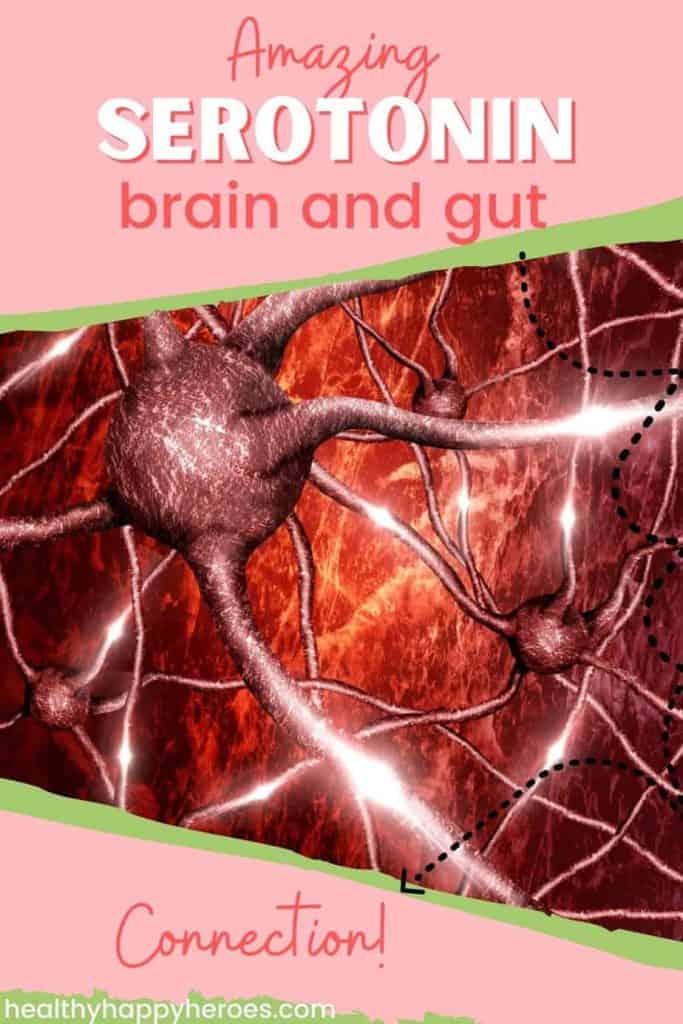Have you ever felt so scared or nervous that you started feeling sick to your stomach?
Seems like a silly question, but nearly everyone has. Most people would agree that the moods and emotions that start in your brain can affect your stomach and gut. But did you know that the connection works the other way around too?
The latest research strongly suggests that our gut, or gut bacteria, can influence our mood. The bacteria in your gut are greatly affected by what we eat. The idea is staggering: Could we simply, by eating something specific, cure our depression and alleviate our anxiety?
According to recent studies, most likely, yes.
Researchers have discovered that there is a direct line between your digestive system and your brain. This connection is called the brain-gut connection or gut-brain axis. So not only does your mind affect your gut, but your gut affects your mind as well.
What is the Gut-Brain Connection or Axis?
We have two nerve centers in our body, one is the brain and the other in the gut. The connection between the intestine and the brain is through the vagus nerve. This is the longest nerve in the human body and acts as a highway between these two vital organs.
How is Serotonin Linked to the Gut-Brain Axis?
There are a myriad of activities going on right now in your nervous system and intestines, and these processes are beyond your control.
The “gut” is another name for everything that makes up your gastrointestinal microbiome. This microbiota is a huge collection of bacteria, fungi, and yeasts that are important in how your body functions.

The gut produces hormones that are important for the entire body and mind. These hormones affect your digestion and absorption of nutrients, and affect your emotions as well. It may seem crazy, but one of the most important hormones produced by the gut is serotonin.
Serotonin, also known as the pleasure hormone, smoothes the ups and downs of emotions caused by depression, fears, and anxiety.
What’s even more amazing is that researchers are discovering that as much as 90-95 percent of your body’s serotonin is produced in the gut.
Animal studies have shown that the modification of gut bacteria can affect memory, behavior, pain sensations, appetite, and learning. According to current knowledge, your intestinal bacteria can be linked to depression, trigger fears, and forgetfulness.
Our gut bacteria is heavily influenced by what we eat and drink. We can eat food that starves the good bacteria in the gut, which can kneecap its ability to manufacture the serotonin our brain so desperately needs.
We can also eat food that enriches our gut bacteria fortifying its ability to produce serotonin which can help to improve our mood and can help with stress, anxiety and depression.
You can even learn how to starve bad gut bacteria if things are out of whack to get your gut back on track.
What’s even more interesting is the fact that each of us has our own characteristic intestinal microbiota. So what works for you might not help the next person.
What’s the Difference between Serotonin Made in the Gut and Serotonin Made in the Brain?
The serotonin produced in the brain is much the same as the serotonin that is produced in the gut. They are both made up of the same molecules, they’re just made in different locations by different types of cells.
Gut-produced serotonin is made by endocrine cells, also known as enterochromaffin cells. Brain-produced serotonin is made by of a subtype of neurons, called raphe neurons. They are the major suppliers of serotonin to the brain. (source)

How Low Serotonin Affects your Mental Health
Serotonin is a neurotransmitter, a chemical in the brain that helps send messages from one area of the brain to another. This brain neurotransmitter is an essential brain chemical and its presence or absence has a major impact on our mood.
As a brain mediator, serotonin helps to transmit messages from one area of the brain to another. Due to the widespread existence of serotonin-receiving cells, it is believed that serotonin levels affect various psychological functions as well as the regulation of physiological sequences.
This means that serotonin directly or indirectly affects most of the approximately 40 million brain cells. This includes brain cells that are associated with mood, desire, , appetite, sleep, memory, learning, temperature regulation, and some social behaviors.
In terms of body function, serotonin can also affect the cardiovascular system, muscles, and various factors in the endocrine system.
Enough serotonin in the brain helps us feel positive, happy, calm, and safe.
Low levels of this crucial brain neurotransmitter can lead to negative or anxious feelings as well as sensations of irritability. A lack of serotonin can make you pessimistic, sad, suspicious, or even cause panic attacks. It can lead to depression, anxiety, and other mental health problems.
Anxiety, the Brain-Gut Connection and the Vagus Nerve
The intestine is home to 200 million neurons. These neurons communicate constantly with those of the brain. In the context of the brain-intestine axis, recent research focuses on the intestinal microbiota and its 10,000 billion bacteria.
Indeed, imbalances in the intestinal microbiota could be involved in certain neurodegenerative diseases (Parkinson, Alzheimer’s), mood disorders (stress, anxiety, etc.), or mental illnesses (depression, autism, etc.).
Through the study of brain images, researchers have shown that often anxious people release a smaller amount of this chemical from the pulse and emotion control area of the brain.

It is also important to mention that insufficient amounts of this important neurotransmitter are not usually the only factor in the development of anxiety disorder, although some people have a hereditary predisposition to low serotonin levels.
In reality, there are three other brain neurotransmitters, gamma-aminobutyric acid, dopamine, and adrenaline that also play an important role in anxiety disorder.
Low serotonin levels are associated with generalized anxiety disorder, panic disorder, and obsessive-compulsive disorder
Depression, the Brain-Gut Connection and Low Serotonin
There are many researchers who believe that an imbalance in serotonin production can affect mood to such an extent that it can cause depression. Possible problems are:
- Low serotonin production by brain cells.
- Lack of reception sites capable of receiving the serotonin produced.
- The inability of serotonin to reach reception sites.
- Deficiency of tryptophan, an essential amino acid required for the synthesis of serotonin.
Researchers believe that any of these biochemical imbalances can cause depression, obsessive-compulsive disorder, anxiety, panic disorder, or even extreme anger. However, several more studies need to be done on the link between serotonin and depression.
Serotonin plays an important role in energy production. Some people who experience chronic fatigue have insufficient amounts of this chemical. When serotonin levels are met, people with fatigue often notice a significant improvement in their energy levels.
While fatigue or exhaustion can be the result of many different conditions, do not eliminate the possibility that it may be due to a problem with serotonin release.
How to Increase Serotonin in your Gut Naturally
There are many things you can do to help stabilize your serotonin levels. Here are some ways to help naturally boost serotonin levels:

- Start doing activities you enjoy. Do activities that allow you to have fun.
- Avoid foods high in saturated fat and simple sugars.
- Eat Omega-3-rich foods to boost optimal brain function.
- Limit your caffeine consumption.
- Get enough sleep.
- Eat and drink foods like kombucha that are loaded with probiotics.
- Eat foods that are high in B vitamins, especially vitamin B6 (this vitamin is important for the development and function of serotonin in the brain).
- Spend time outdoors and enjoy the sunlight.
- Practice meditation and conscious presence.
Changes in your diet can also help boost your serotonin levels naturally.
Eat a Diet That Helps Your Mood
Since a deficiency in tryptophan can contribute to low serotonin levels, some diets focus on keeping tryptophan at healthy levels.
The absorption of tryptophan in the brain is likely to be more effective with a low-protein diet, similar to the Mediterrean diet. If you eat a lot of protein, ratios of this important amino acid can be thrown off.
A balanced diet with a lot of grains, fruit, fish, and vegetables, with smaller amounts of cheese, meat, and sugars, can apparently stabilize tryptophan levels and at the same time improve mood.
Scientists also tested the diet against premenstrual syndrome (PMS), in which women suffer from exhaustion, listlessness, mood swings, and fatigue in the days before menstruation. For the majority of women, mood can be improved with appropriate food choices.
Does Fish Protect Against Depression?
A drug can never replace a wholesome and well-thought diet. This has been shown by several studies on depressed patients, which the American researcher, Joseph Hibbeln, from the National Institutes of Health has demonstrated. He has been studying the influence of fish on the state of mind for years.
The more fish is consumed, the less depression is observed in a country. In countries like Japan or Taiwan, there are around 60 times fewer people with depression than in Germany or Canada. The suicide rates are correspondingly lower in Asian countries.
Among many of the researches done in this niche, one such study demonstrates that fish may protect against depression and ultimately can also alleviate it. Subjects who ate marine or freshwater fish less than once a week had a 31 percent higher risk of disease than those who ate fish more frequently.
Hibbeln and other researchers suggest that the omega-3 fatty acids in fish may be responsible for the differences. Similar to some antidepressants, they can improve brain function. It is a low blood level of omega-3 fatty acids which leads to a serotonin deficiency.
Natural Antidepressants
There was research done by Harvard University, which indicated a mood-enhancing effect of omega-3 fatty acids. Manic depressive patients were given either fish oil or olive oil capsules for four months. Only the fish oil was able to reduce the symptoms of the disease.
Since fish also contains vitamin D and this vitamin promotes serotonin production in the brain, this could also explain the mood-enhancing effect.
However, the researchers do not comment on the validity of the results. In the meantime, several studies have tested whether fish oil, in particular omega-3 fatty acids, helps against depression and mental disorders.
In a study by Sheffield University, for example, 70 depressed patients were given high doses of omega-3 fatty acid. The people had not responded to common antidepressants. In more than two-thirds of the cases, the condition improved and the intervals between periods of severe depression widened.
The Takeaway: Your Gut Health Plays a Bigger Role in Serotonin Production Than Most Think.
Understanding the importance of the gut-brain axis can pave the way for improved mental health.
Eating in a way to support your natural gut biome can help your body actually produce more serotonin. Understanding how serotonin is produced and used by your body can help you make better choices in your daily diet, like following a Mediterranean diet.
Additionally, adding cold water fish to your diet as well as other lifestyle changes can help your gut-brain connection work at its optimum level for better levels of serotonin and reduced anxiety and depression.
Want To Remember This Gut-Brain Connection Serotonin Post? I’d Love It If You’d Pin It To Your Favorite Healthy Living Pinterest Board And Pass It On!

